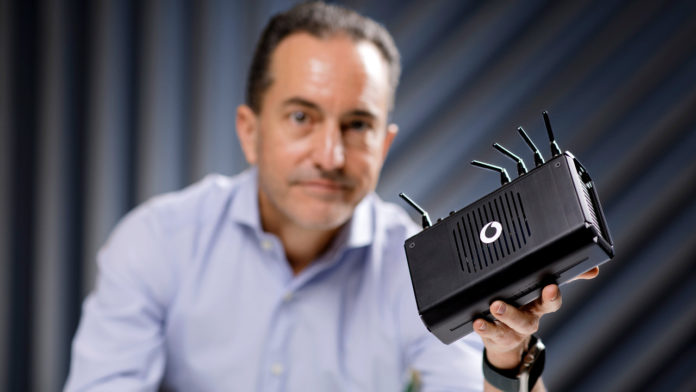Private cellular in a box? It is hardly a novel idea, as Athonet and Druid Software will testify, including via commercial air-drop installations at music shows and war zones, or suchlike. But a new card-sized private 5G prototype from UK operator Vodafone looks genuinely meaningful, and differentiated from these other propositions. It hints at how the needle might be moved in this enterprise IoT story – that bare-bones 5G will, one day, be a box-shifting exercise for the old dealer channel.
This is, of course, a narrative that Enterprise IoT Insights, before it was part of RCR Wireless, spun-out over a long period of time – and one that may yet put the traditional operator set, alongside the likes of Cisco and HPE, in a unique position in the enterprise supplier market, courtesy of their specialist reseller channels. Because while the market is in a spin about mission-critical IoT for industrial mega-corps, the SME market is where the action is.
It is where private 5G will scale and mature – at the point it ‘just works’, when technical innovation and market regulation is less important than commercial presentation and after-sales support; to the point it is just a telecoms mainstay. Small and medium-sized enterprises (SMEs) represent 99 percent of all businesses in Europe, after all; so says the European Commission. The US Small Business Administration (SBA) says the same about the US.
Which makes Vodafone’s move – to release a private 5G network mockup on a Raspberry Pi (version 4) computer – interesting, even just as a talking point ahead of the MWC bun fight next week (where everyone will talk about private 5G like they know what is going on). Anyway, to the announcement: Vodafone is calling it an “industry-first concept” to enable small businesses, and even households, to extend 5G coverage and increase 5G capacity.
On paper, it is an all-Europe affair, to be available across its networks in the region, based on a concept about an “ultra-secure slice of coverage”, and some kind of “advanced silicon” – a 4G/5G software-defined radio (from UK-based Lime Microsystems), embedded in a circuit board. Vodafone wants to “democratise” private 5G for SMEs, which number 22 million in Europe, it reckons; it also imagines its value as a coverage extender for consumers.
It explained: “[Private networks] are predominantly used by large businesses or organisations with premises that need to connect a variety of devices, machines and autonomous vehicles and robots, such as major manufacturing plants. Vodafone is now looking at ways to democratise… and extend their benefits to micro and small business owners whilst lowering the entry cost and reducing the resources needed to experience new digital services.”
Which – without wishing to editorialise, nor to cheerlead, but compelled to flag clever innovation – sounds positive, and like a proper finger-in-the-air MWC showcase item. The prototype, based on open RAN standards, developed by Vodafone’s new European R&D Centre in Málaga, is about the size of a home Wi-Fi router, it said, making it portable – for carrying with a laptop to a coffee shop, or wherever else.
The Málaga unit is developing silicon chips for other open RAN projects, using a mix of hardware and software from multiple vendors. Vodafone continued: “This SDR board can turn any computing platform into a miniature 5G base station. The resulting system can then be used either as part of a dedicated private network, an extension of a larger private network, or connected to Vodafone’s public network like any other base station.”
Santiago Tenorio, director of network architecture at Vodafone, commented: “We looked at what Raspberry Pi did for computing, in terms of making it more accessible to people of all ages, and we wanted to do the same with 5G. Whilst this is just a prototype, it has the potential to bring new cloud, AI and big data technologies within reach of many of the small businesses we support across Europe. The next step is to take ideas like this to a place where they can be developed and eventually produced. Our door is open to interested vendors.”

